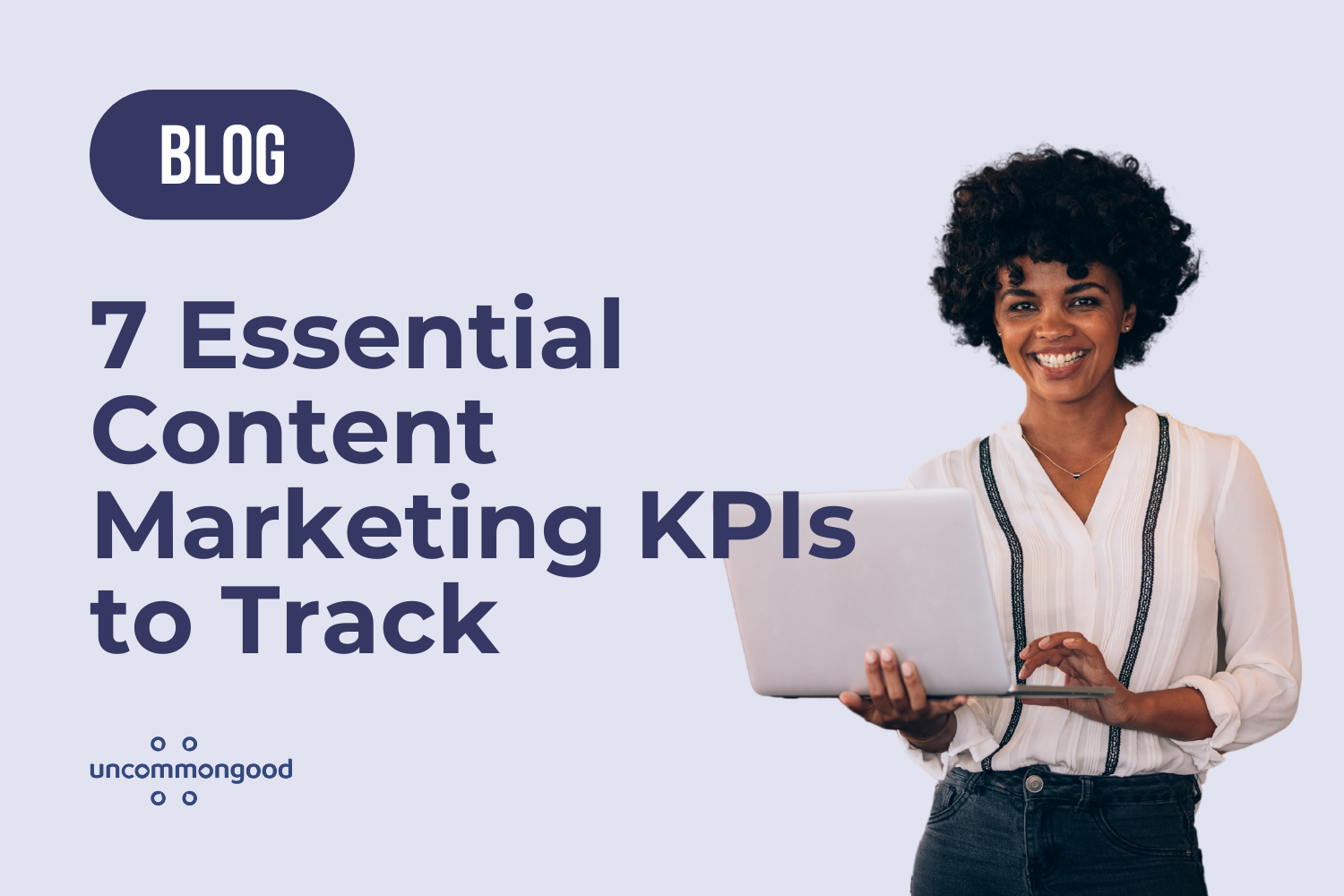Whether you’re just dipping your toes into content marketing or you already have a well-oiled content machine, it’s important to continually measure the performance of your content to see what’s working and what might need a glow-up.
In this blog post, you’ll learn how to measure the performance of your content plus the best metrics and key performance indicators (KPIs) to track.
What is a KPI?
A KPI, or key performance indicator, is a quantifiable measure of progress or performance towards a business goal or outcome. For example, in marketing, a common KPI is increasing organic web sessions over a period of time. This KPI aligns with the business goals of generating brand awareness and sales leads.
KPI vs. metric
While every KPI is a metric, not every metric is a KPI. For example, the above KPI uses the metric of monthly organic web sessions to measure progress toward an increase in organic web sessions over a defined period.
How to define a KPI
Here’s how you could define the above example KPI:
- Business goal: Increase brand awareness in the marketplace
- Success indicator: Organic web sessions increase by 50% in six months
- Metric to measure: Organic web sessions
- Data source: Google Analytics
- Frequency: Monthly (This frequency helps you measure your progress over time so you can tweak your strategy as you go, making it more likely to achieve progress towards your goal!)
Why is it Important to Measure Content Performance?
When it comes to content marketing, creating and distributing content is only half the battle. To make sure you’re investing your content resources appropriately and achieving your business goals, it’s important to understand what’s working and what’s not.
Remember: even if you’re “just” publishing a few blog posts, emails, or social media posts each month, it’s critical to start tracking their performance ASAP. Think of it as another way to maximize your productivity!
Here are a few more reasons why it’s important to measure the performance of your content:
- Return on investment (ROI) optimization: Knowing the impact of your content efforts on your bottom line helps you optimize resources and ensure that your content initiatives align with business goals.
- Strategy refinement: Regular measurement provides insights into what works and what doesn’t. Analyzing performance data allows you to refine and tweak your content marketing strategy for better engagement and resonance with your target audience.
- Audience understanding: Content performance metrics reveal valuable information about your audience. Understanding which content resonates with them helps in tailoring future content to meet their preferences, ultimately building a stronger connection.
- Competitive benchmarking: By measuring your content marketing efforts, you gain the ability to benchmark your performance against competitors. This competitive intelligence is crucial for staying ahead in the market and adapting your strategy to stand out.
7 Essential Content Marketing KPIs to Track
It’s easy to feel overwhelmed by the sheer number of marketing metrics out there. That’s why it’s important to prioritize KPIs that align with your business priorities.
For example, if you just kicked off your freelance journey, you’re probably focused on establishing your business in the marketplace and finding work. In terms of KPIs, you should prioritize measuring performance towards these goals.
Here are eight content marketing KPIs to start tracking now:
| Metric | What to Track | Why it’s Important |
| Web traffic | Pageviews, new and returning visitors, time spent on site, bounce rates | Helps you gauge the effectiveness of your content in attracting website visitors |
| Conversion rates | Whether your content resulted in a desired action, like signing up for a free trial of your software or making a purchase | Helps you understand whether your content is resonating with potential new customers |
| Social media engagement | Post impressions, likes, shares, comments, total followers, and other engagement metrics on your social media platforms | Indicates your content’s reach and relevance with your target audience |
| Search engine visibility | Keyword rankings, organic traffic, SERPs, and backlink acquisition | Helps you understand how well your content is optimized for search engines |
| Sales leads | The number of leads generated through your content, whether through gated content, contact forms, or other means | Helps in quantifying the tangible benefits of your strategy |
| Email metrics | Open rates, click-through rates, and conversion rates | Provides insights into the effectiveness of your email content |
| Customer sentiments / preferences | Solicit feedback from your audience through surveys or comments. Monitor customer reviews and star ratings. | Guides future content creation and strategy adjustments |
Conclusion
You’re creating some great content and sharing your unique POV with the world. Don’t let your hard work go to waste! By evaluating content performance, you can refine your content strategy to ensure your content reaches and resonates with your target audience.
Download Our Free Content Strategy Ebook
Ready to level up your content marketing? Download our FREE ebook, The Ultimate Guide to Creating a Content Strategy for Freelancers and Small Businesses. In this guide, you’ll learn the key steps to creating a content strategy, plus tips, examples, and best practices to hit the ground running.




